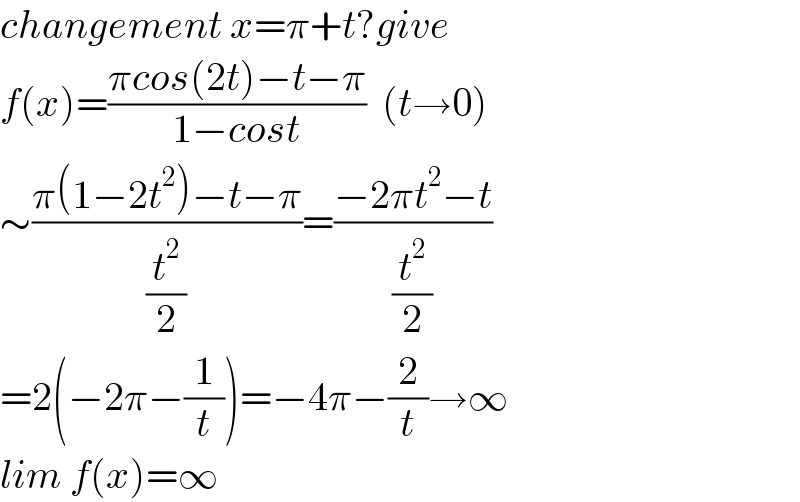Question Number 169182 by mathlove last updated on 25/Apr/22

$$\underset{{x}\rightarrow\pi} {\mathrm{lim}}\frac{\pi{cos}\mathrm{2}{x}−{x}}{\mathrm{1}+{cosx}}=? \\ $$
Commented by infinityaction last updated on 25/Apr/22

$${use}\:{l}\:{hospital}\:{rule} \\ $$$$\:\:\:\:{p}\:\:\:=\:\:\:\underset{{x}\rightarrow\pi} {\mathrm{lim}}\:\frac{−\mathrm{2}\pi\mathrm{sin}\:\mathrm{2}{x}\:−\:\mathrm{1}}{−\mathrm{sin}\:{x}} \\ $$$$\:\:\:\:\:{p}\:\:\:=\:\:\:\underset{{x}\rightarrow\pi} {\mathrm{lim}}\:\frac{\mathrm{2}\pi\mathrm{sin}\:\mathrm{2}{x}+\:\mathrm{1}}{\mathrm{sin}\:{x}} \\ $$$$\:\:\:\:\:\:{p}\:\:\:\:=\:\:\:\frac{\mathrm{2}\pi×\mathrm{0}+\mathrm{1}}{\mathrm{0}}\:=\:\frac{\mathrm{1}}{\mathrm{0}} \\ $$$$\:\:\:\:\:\:{p}\:\:\:\:\:=\:\:\:\:\infty \\ $$$$\:\:\: \\ $$
Answered by qaz last updated on 25/Apr/22

$$\underset{\mathrm{x}\rightarrow\pi} {\mathrm{lim}}\frac{\pi\mathrm{cos}\:\mathrm{2x}−\mathrm{x}}{\mathrm{1}+\mathrm{cos}\:\mathrm{x}}=\underset{\mathrm{x}\rightarrow\mathrm{0}} {\mathrm{lim}}\frac{\pi\mathrm{cos}\:\mathrm{2x}−\mathrm{x}−\pi}{\mathrm{1}−\mathrm{cos}\:\mathrm{x}}=\underset{\mathrm{x}\rightarrow\mathrm{0}} {\mathrm{lim}}\frac{\pi\left(\mathrm{1}−\mathrm{2x}^{\mathrm{2}} \right)−\mathrm{x}−\pi}{\frac{\mathrm{1}}{\mathrm{2}}\mathrm{x}^{\mathrm{2}} }=\pm\infty \\ $$
Commented by JDamian last updated on 25/Apr/22
wrong
Commented by qaz last updated on 25/Apr/22

$$\mathrm{why}\:\mathrm{would}\:\:\mathrm{you}\:\mathrm{default}\:\mathrm{to}\:'\:\mathrm{x}\rightarrow\pi^{+} \:'\:?\:\:\mathrm{why}\:\mathrm{not}\:'\:\mathrm{x}\rightarrow\pi^{−} \:'\:? \\ $$
Answered by Mathspace last updated on 25/Apr/22

$${changement}\:{x}=\pi+{t}?{give} \\ $$$${f}\left({x}\right)=\frac{\pi{cos}\left(\mathrm{2}{t}\right)−{t}−\pi}{\mathrm{1}−{cost}}\:\:\left({t}\rightarrow\mathrm{0}\right) \\ $$$$\sim\frac{\pi\left(\mathrm{1}−\mathrm{2}{t}^{\mathrm{2}} \right)−{t}−\pi}{\frac{{t}^{\mathrm{2}} }{\mathrm{2}}}=\frac{−\mathrm{2}\pi{t}^{\mathrm{2}} −{t}}{\frac{{t}^{\mathrm{2}} }{\mathrm{2}}} \\ $$$$=\mathrm{2}\left(−\mathrm{2}\pi−\frac{\mathrm{1}}{{t}}\right)=−\mathrm{4}\pi−\frac{\mathrm{2}}{{t}}\rightarrow\infty \\ $$$${lim}\:{f}\left({x}\right)=\infty \\ $$
